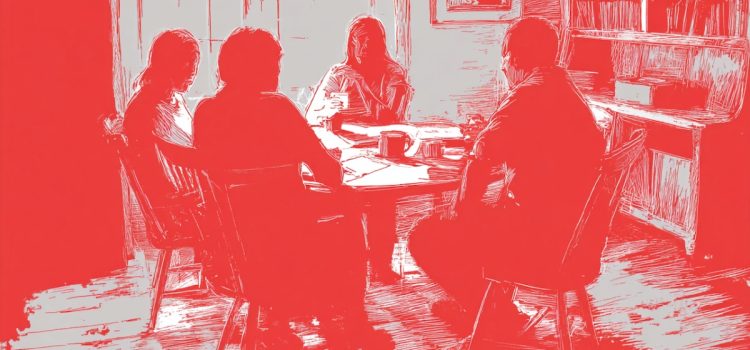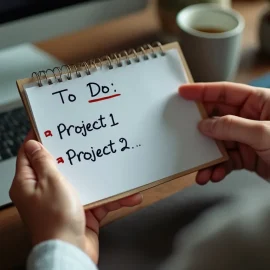
We’ve put together discussion questions for Think Again by Adam Grant that you can use with a book club, a class at school, or a team at work. We include sample answers, book club activities that will help you get more out of what you’ve read, and recommendations for more reading if you like this book.
Book Synopsis
Think Again explores the critical importance of rethinking and unlearning in a rapidly changing world. Adam Grant argues that intelligence isn’t just about what we know, but about recognizing what we don’t know and being willing to update our beliefs. He introduces the concept of thinking like a scientist—embracing doubt, running experiments with our ideas, and revising our views based on new evidence—rather than like a preacher just defending our beliefs, a prosecutor simply attacking others’ views, or a politician only campaigning for approval.
The book provides practical strategies for becoming more mentally flexible, both individually and in organizations. Grant examines how to create cultures of learning, conduct more productive disagreements, and help others open their minds without triggering defensiveness. Through research and engaging stories, he demonstrates that the ability to question our assumptions and change our minds is not a weakness but a crucial strength that leads to better decisions, stronger relationships, and greater innovation. The central message is that, in a world of constant change, the willingness to rethink our positions could be our most important skill.
Read Shortform’s comprehensive guide to this book.
Think Again Discussion Questions & Sample Answers
Along with discussion questions for Think Again, we include sample answers you can use as prompts.
- What are the main differences between thinking like a preacher, prosecutor, politician, and scientist (as Grant describes them)? Which mode do you find yourself in most often?
- Sample answer: Preachers tend to defend their sacred beliefs, prosecutors generally attack others’ arguments, and politicians often campaign for approval, while scientists are supposed to test hypotheses and update views based on evidence. I find myself most often in prosecutor mode when discussing politics; I focus on poking holes in opposing arguments rather than genuinely considering whether I might be wrong about my own positions.
- Can you think of a significant time in your life when you changed your mind about an important belief? What prompted that change?
- Sample answer: I used to believe that working longer hours automatically meant better career success. After burning out and seeing colleagues achieve more with better work-life balance, I rethought this assumption. The change came from both personal experience and observing contradictory evidence in others’ lives.
- Grant discusses the concept of “confident humility.” How can someone be both confident and humble simultaneously?
- Sample answer: Confident humility means being secure in your capabilities while remaining aware of your limitations and knowledge gaps. For example, a doctor can be confident in his diagnostic skills while humbly acknowledging he doesn’t know everything about a rare condition and needs to consult specialists or recent research.
- How does attachment to our past beliefs and identities prevent us from rethinking? Can you share a personal example?
- Sample answer: When we tie beliefs to our identity, changing our minds feels as though we’re losing part of ourselves. I identified as “someone who hates exercise” for years, which prevented me from trying new activities. When I separated the behavior from my identity, I could explore different forms of movement—and discovered I actually enjoy hiking!
- What role does joy of being wrong play in creating a learning mindset? How can we cultivate this counterintuitive attitude?
- Sample answer: Finding joy in being wrong means viewing corrections as opportunities to become smarter rather than personal failures. We can cultivate this by celebrating when we discover errors before they cause bigger problems, keeping a “things I was wrong about” journal, and surrounding ourselves with people who model this attitude.
- Grant describes the “totalitarian ego” that prevents us from questioning ourselves. How do you recognize when your ego is blocking productive rethinking?
- Sample answer: I notice my totalitarian ego when I feel defensive during feedback, when I’m more focused on winning an argument than finding truth, or when I immediately dismiss information that contradicts my views. Physical cues such as tension or anger are warning signs that ego has taken over.
- How can we apply the scientific method to our everyday decisions and beliefs?
- Sample answer: We can treat our opinions as hypotheses to test rather than truths to defend. For instance, if I believe a certain productivity method works best, I could experiment with alternatives for set periods, track results objectively, and update my approach based on actual outcomes rather than confirmation bias.
- What strategies does Grant suggest for having more productive disagreements? Which do you find most challenging?
- Sample answer: Grant suggests finding common ground, asking questions rather than making statements, and acknowledging what you agree with before disagreeing. I find it most challenging to slow down and ask genuine questions when I’m convinced I’m right; my instinct is to immediately present counterarguments.
- How can leaders create a culture that encourages rethinking rather than penalizing changed minds?
- Sample answer: Leaders can model rethinking by publicly sharing when they’ve changed their minds, rewarding employees who identify flaws in current processes, and creating psychological safety where admitting uncertainty or error doesn’t carry professional consequences. They should celebrate “productive failures” that generate learning.
- Charging people with apple picking instead of just picking apples changes their engagement. What does this teach us about motivation and ownership?
- Sample answer: When people are “charged with” a task rather than just told to do it, they feel greater ownership and responsibility. It changes the activity from something done to them into a mission they’re entrusted with. This subtle language shift can dramatically increase intrinsic motivation and creative problem-solving.
- What’s the “illusion of explanatory depth,” and how does it affect our confidence in our opinions?
- Sample answer: The illusion of explanatory depth is our tendency to think we understand complex things better than we actually do. When asked to explain how a zipper or toilet works in detail, most people realize their understanding is superficial. This exercise can make us more humble about our political, economic, or social opinions that we’ve never deeply examined.
- How can we better help others rethink their views without triggering defensiveness or backfire effects?
- Sample answer: Rather than directly attacking someone’s belief, we can ask questions that guide them to discover inconsistencies themselves. We should listen first, find common ground, and acknowledge the legitimate concerns underlying their view. Motivational interviewing techniques—asking about their own reasons for change—work better than providing external arguments.
- What does Grant mean by having “strong opinions, weakly held”? Is this always the best approach?
- Sample answer: This means forming clear viewpoints based on available evidence but remaining ready to revise them when new information emerges. It’s not always best; in domains with strong evidence and consensus (such as basic science) or in ethical principles, we shouldn’t be easily swayed. But for complex, evolving issues, this flexibility is valuable.
- How can we distinguish between beliefs that should be held firmly and those that should remain flexible?
- Sample answer: Core ethical values and principles supported by overwhelming evidence deserve firm commitment. Meanwhile, predictions about uncertain futures, strategies for complex problems, and opinions outside our expertise should remain flexible. The key is recognizing which category a belief falls into and remaining honest about the quality of supporting evidence.
- How do binary thinking and stereotyping limit our ability to rethink people and situations?
- Sample answer: Binary thinking forces complex realities into oversimplified either/or categories: good/bad, smart/dumb, liberal/conservative. This prevents us from seeing nuance, growth, and context. When we stereotype a difficult colleague as “just lazy,” we miss that they might be overwhelmed, struggling with health issues, or responding to poor management.
- Grant describes “tunnel vision” in experts. When does expertise become a liability for rethinking?
- Sample answer: Expertise becomes a liability when it creates overconfidence and closes us off to alternative perspectives, especially when conditions change. An experienced executive might dismiss new business models because “that’s not how our industry works,” missing disruptive innovations. Experts can become prisoners of their own knowledge.
- What’s the importance of psychological safety—the belief that you won’t be punished for mistakes, questions, or disagreements—in teams, and how does it relate to rethinking?
- Sample answer: Psychological safety is essential for rethinking because people need to feel safe admitting uncertainty and challenging the status quo. Without it, team members hide doubts, conform to bad decisions, and avoid the productive conflict necessary for innovation.
- Grant discusses “desirability bias” and “feasibility bias” in career decisions. How do these biases affect major life choices?
- Sample answer: Desirability bias makes us focus on whether we want an outcome without seriously considering if it’s achievable, while feasibility bias does the opposite—we might pursue only “realistic” goals while ignoring what would truly fulfill us. Balanced thinking requires honestly assessing both dimensions when making career changes or major life decisions.
- What role does building a “challenge network” rather than just a support network play in personal growth?
- Sample answer: While support networks affirm and encourage us, challenge networks include people who question our assumptions and point out our blind spots. My challenge network includes a brutally honest friend who asks hard questions about my plans and a mentor who highlights when I’m being overconfident. They’re less comfortable but more valuable for growth.
- How can we apply the lessons from Think Again to current polarized social and political discourse?
- Sample answer: We could start by adopting scientist mode—treating our political views as hypotheses rather than identities, seeking out the strongest versions of opposing arguments, and finding nuance in complex issues. We should create spaces for genuine questions rather than just arguments, acknowledge legitimate concerns across perspectives, and reward politicians who update their positions based on evidence rather than attacking them as “flip-floppers.”
Exercises for This Book
Discussing Think Again can be just the beginning! Use these exercises to get even more out of the book and apply its principles to your life.
Exercise 1: The Rethinking Journal
Keep a dedicated journal for 30 days where you document your rethinking practice. Each week, focus on a different aspect:
- Week 1—Mode Awareness: Track which thinking mode (preacher, prosecutor, politician, or scientist) you find yourself in during disagreements or decisions. Note the situation, your mode, and what triggered it. At the end of the week, identify patterns in when you default to each mode.
- Week 2—Wrong Log: Record at least one thing each day that you were wrong about. It can be small (thinking a meeting was at 2 p.m. when it was at 3 p.m.) or significant (realizing a judgment about a coworker was unfair). Beside each entry, note what you learned and how discovering the error actually benefited you. The goal is to reduce the emotional sting of being wrong.
- Week 3—Belief Audit: Choose three to five strong opinions you hold. For each, write down: Why do you believe this? What evidence supports it? What would change your mind? When did you last seriously reconsider this view? This helps identify which beliefs you’re holding through inertia versus active reasoning.
- Week 4—Rethinking Wins: Document moments when you successfully changed your mind, helped someone else rethink, or had a productive disagreement. Describe what made it work. Celebrating these wins reinforces the behavior.
Exercise 2: The Challenge Network Dinner
Organize a monthly dinner or gathering with your “challenge network”—people who will question your thinking rather than just support you. Structure the evening around productive rethinking:
- Setup: Invite three to five people known for thoughtful disagreement, intellectual honesty, or expertise in areas where you need perspective. These might include a colleague who sees problems you miss, a friend with different political views, or a mentor who gives tough feedback.
- Format: Each person brings one current belief, decision, or plan they’re willing to have challenged. Take turns presenting (10 to 15 minutes each), followed by group questioning. The presenter’s job is to listen in scientist mode and genuinely consider alternatives, not defend their position.
- Ground Rules: Questions should be curious, not attacking. The goal is helping each other think better, not winning arguments. Everyone practices “strong opinions, weakly held.” After discussion, the presenter summarizes what they learned or what they’ll reconsider.
- Follow-up: At the next gathering, each person shares if and how their thinking evolved on their topic. This reinforces that changing your mind based on good input is a strength worth celebrating.
Exercise 3: The Explanatory Depth Test & Research Project
Use Grant’s concept of the “illusion of explanatory depth” to identify areas where your confidence exceeds your knowledge, and fill those gaps:
- Week 1—Test Your Understanding: Choose three to five topics you have strong opinions about. These might be political issues, business strategies, parenting approaches, or social policies. For each, write a detailed explanation of how it works, including mechanisms, tradeoffs, and why alternatives wouldn’t work better. Try to explain it clearly enough that someone unfamiliar with the topic would understand. Most people discover their understanding is much shallower than they thought.
- Week 2—Seek Contrary Evidence: For each topic, deliberately seek out the strongest arguments against your position. Read articles or books by credible people who disagree with you. The goal isn’t to find easy-to-dismiss strawman arguments, but the most compelling opposition cases. Summarize these arguments fairly—so well that someone holding that view would agree with your summary.
- Week 3—Informed Rethinking: Now revisit your original positions. Write a new analysis that includes what you still believe and why, what you’ve changed your mind about, what nuances you now see that you missed before, and what you’re now uncertain about. Share this process with someone else, and discuss how filling in your knowledge gaps affected your confidence and conclusions.
- Bonus Extension: Make this a quarterly practice for important domains in your life—career strategy, health decisions, financial planning, or relationships. The goal is building a habit of checking whether your confidence is justified by your actual understanding.
If You Like Think Again
If you want to read more books like Think Again, check out these titles:
- Mindset: The New Psychology of Success—Readers who appreciate Grant’s emphasis on rethinking and intellectual flexibility will find natural alignment with Carol Dweck’s concept of growth versus fixed mindsets. Her research shows that people who believe abilities can be developed (growth mindset) are more willing to embrace challenges, learn from criticism, and persist through setbacks—all essential components of the rethinking process Grant advocates. While Think Again focuses on updating beliefs and opinions, Mindset addresses the underlying psychology that makes such updating possible. The books complement each other beautifully: Dweck explains why some people see being wrong as a threat to their identity while others see it as an opportunity to grow, providing the foundational psychology for Grant’s more specific strategies about reconsidering our views in professional and personal contexts.
- The Scout Mindset: Why Some People See Things Clearly and Others Don’t—This book by Julia Galef is perhaps the closest companion to Think Again, exploring the difference between the “soldier mindset” (defending our existing beliefs against threats) and the “scout mindset” (seeking to understand the landscape as accurately as possible). Like Grant, Galef draws on cognitive science and real-world examples to show how motivated reasoning distorts our thinking, but she goes deeper into the emotional and social rewards that keep us trapped in directionally motivated reasoning. Where Grant organizes thinking modes around preacher, prosecutor, politician, and scientist, Galef uses the military metaphor of scouts versus soldiers. Readers will appreciate how both books provide techniques for recognizing when we’re rationalizing rather than reasoning, and both argue that accuracy-seeking isn’t just intellectually superior but often leads to better life outcomes. Together, they form a comprehensive guide to clearer thinking.
- Range: Why Generalists Triumph in a Specialized World—While Think Again is about the willingness to update beliefs, David Epstein’s Range explores how breadth of experience and knowledge actually facilitates better thinking and problem-solving. Epstein challenges the “10,000 hours” narrative, showing that, in complex, unpredictable domains, people with varied experiences often outperform narrow specialists; they’re better at thinking laterally, analogizing across domains, and adapting to new situations. This connects directly to Grant’s warnings about expert overconfidence and tunnel vision. Range provides the “why” behind Grant’s observation that expertise can become a liability: specialists sometimes struggle to rethink because they’ve optimized for a particular context. Both books celebrate intellectual flexibility and curiosity over rigid adherence to established patterns. Readers interested in how to build a life and career that supports continuous rethinking will find Range offers a broader developmental framework that complements Grant’s specific cognitive strategies.
Discuss More Books
Shortform has discussion questions for scores of books. Take a look!






